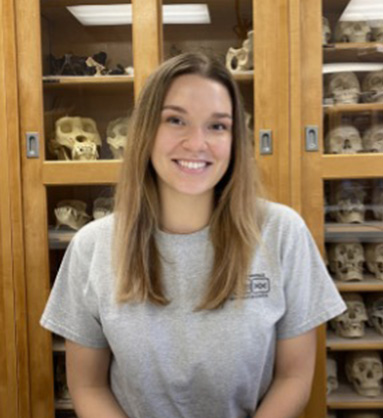
Izzy Melhado
- Major: Human Biology
- Class: Graduate Student
- Hometown: Slidell, LA
- Role: Field Expert
Why is this humanitarian work important to you?
Being able to help others has always been important to me. Some people don’t really understand what it means to help others when working with those who have passed. However, being able to identify who that person was and how they died can bring closure to their living family members. They were someone’s brother, sister, mother, cousin, teacher, friend, family, etc, and they deserve the same respect in death as in life. This specific humanitarian mission is important to me because I believe human rights should not be a political topic and should not be optional based on your race, religion, gender, country of origin, etc. I also feel very strongly about this because I am the child of an immigrant. My father came to the US many years ago for university, but so many others are not able to have that opportunity.
What do you hope to gain from this experience?
I hope to gain a number of things from this experience. I hope to learn a number of fieldwork techniques like coordinated searches and mapping specifics, better teamwork skills, and personally, a better understanding of the humanitarian crisis occurring at the border.
What are some of the biggest challenges you will face while in Texas?
I believe Texas will bring a number of challenges. It will be my biggest fieldwork experience thus far, so there will be a lot of learning while doing. I am definitely worried about the environment. Because I am from South Louisiana, I have years of experience in the heat and humidity, but living in Indiana has definitely taken a toll on how well I can handle that kind of weather. I also think one of the bigger challenges of this experience is the mental toll it comes with. This trip is not something that you can do and then just forget. It’s hard to be limited in what you can do for others and to see the struggles they have to endure. It comes with a number of emotions and thoughts, so I’m thankful I’m part of a team that takes the time to decompress every evening to process what went on during the day.
What’s one thing people probably don’t know about you until they’ve known you a long time?
One thing people probably don’t know about me until they’ve known me for a long time is that I have a debilitating phobia of frogs. I don’t know why or where it stems from, but I cannot even see a frog or toad without having a physiological reaction. Probably not what you were expecting to find under this question, but it’s true.
When did you know you wanted to pursue human biology as a degree, and how did you become interested in forensics?
I knew I wanted to pursue Human Biology as a degree when I found the degree at UIndy. My passion was always for science in general. My Bachelor’s degree is in biology, where I later concentrated in forensic science and minored in anthropology, so I knew I wanted to stay on the scientific side of forensic anthropology. Finding the Human Biology program at UIndy was the perfect match for what I was looking for.
I became interested in forensics long before I viewed it as a potential career. I listened to true crime podcasts, watched all the detective shows etc etc, but it was just a hobby. I was originally a pre-med major in undergrad, and when I decided that wasn’t for me, my mom actually said, “Well, you’re my CSI kid. Why don’t you try forensics?” To say it is a moment I will never forget is an understatement because from then on, my whole path changed. From there, taking anatomy and physiology and intro to anthropology at the same time showed me that forensic anthropology was exactly where I wanted to be.
What advice would you give other students interested in pursuing a human biology degree at UIndy?
Some advice I’d give other students interested in pursuing a human biology degree at UIndy is don’t underestimate yourself, ask any questions you may have, and communicate as much as possible. If you’re afraid you are missing some qualifications to apply here or have any questions at all, don’t be afraid to reach out to any or all of our professors. If you don’t feel comfortable communicating with a professor for some questions, they can direct you to a student in the program to help.
What makes UIndy’s human biology program distinctive?
UIndy’s human biology program is distinctive because it is purposefully small, and rather than a focus just on anthropology, there is a scientific focus. The small program allows for easy interactions between your advisor, professors, and yourself. Here, you’ll never be just a face in a crowd. Along with preparing you for a possible PhD, it opens more doors in a number of different fields because of that scientific focus, such as gross anatomy, humanitarian work, microbiology, genetics, CSI, and much more.